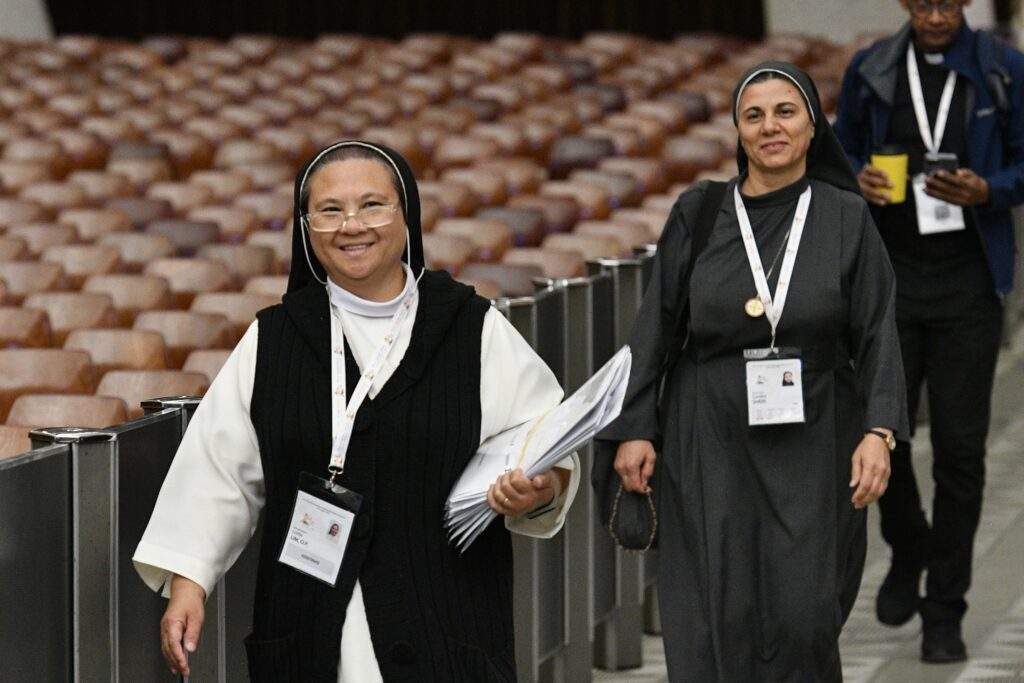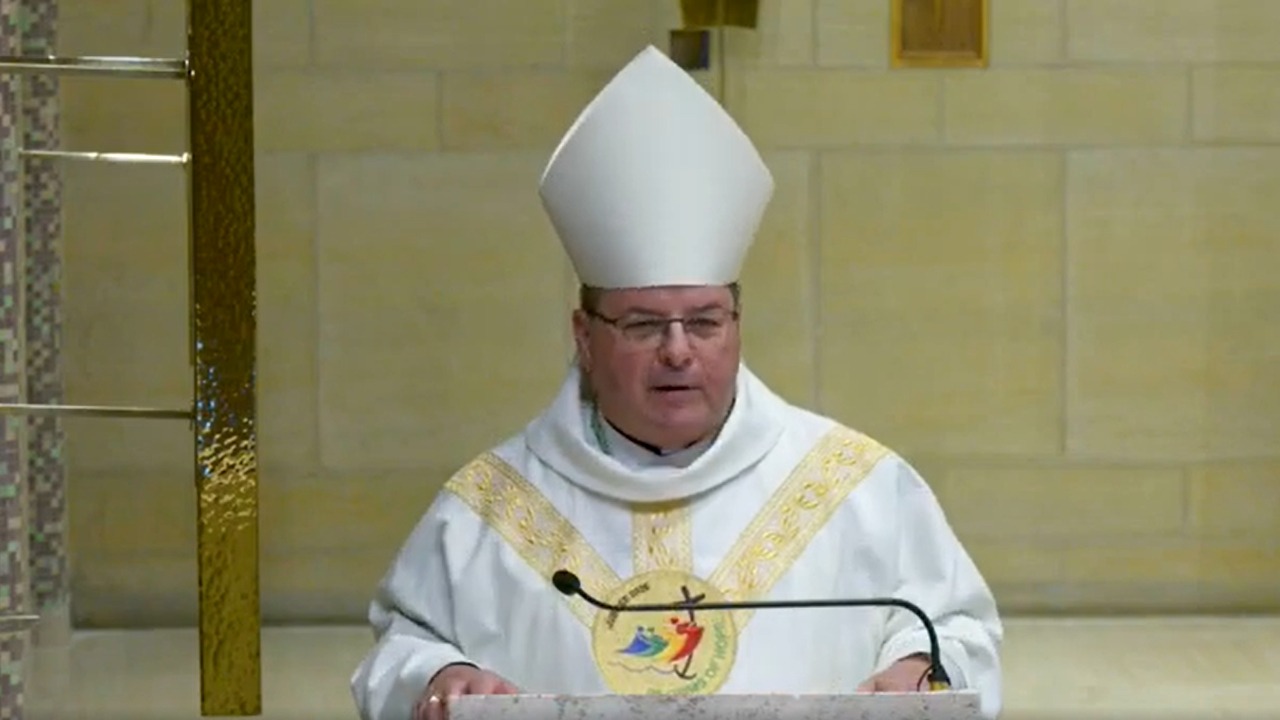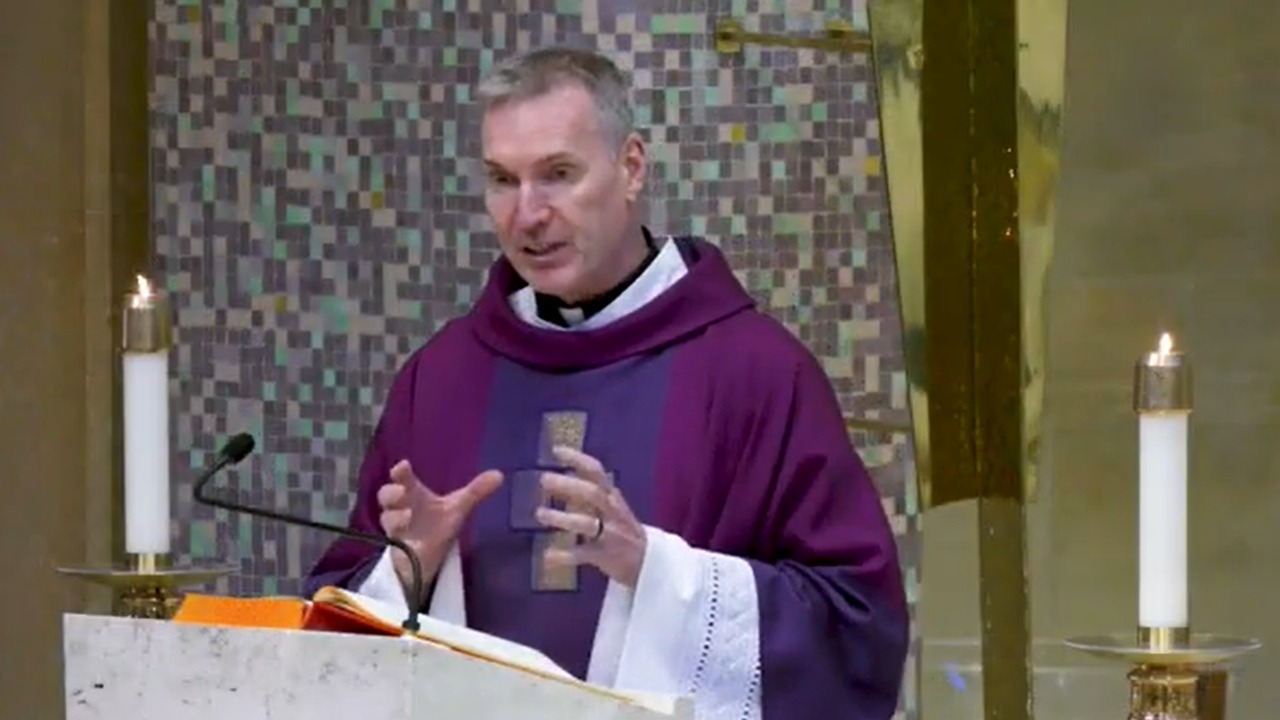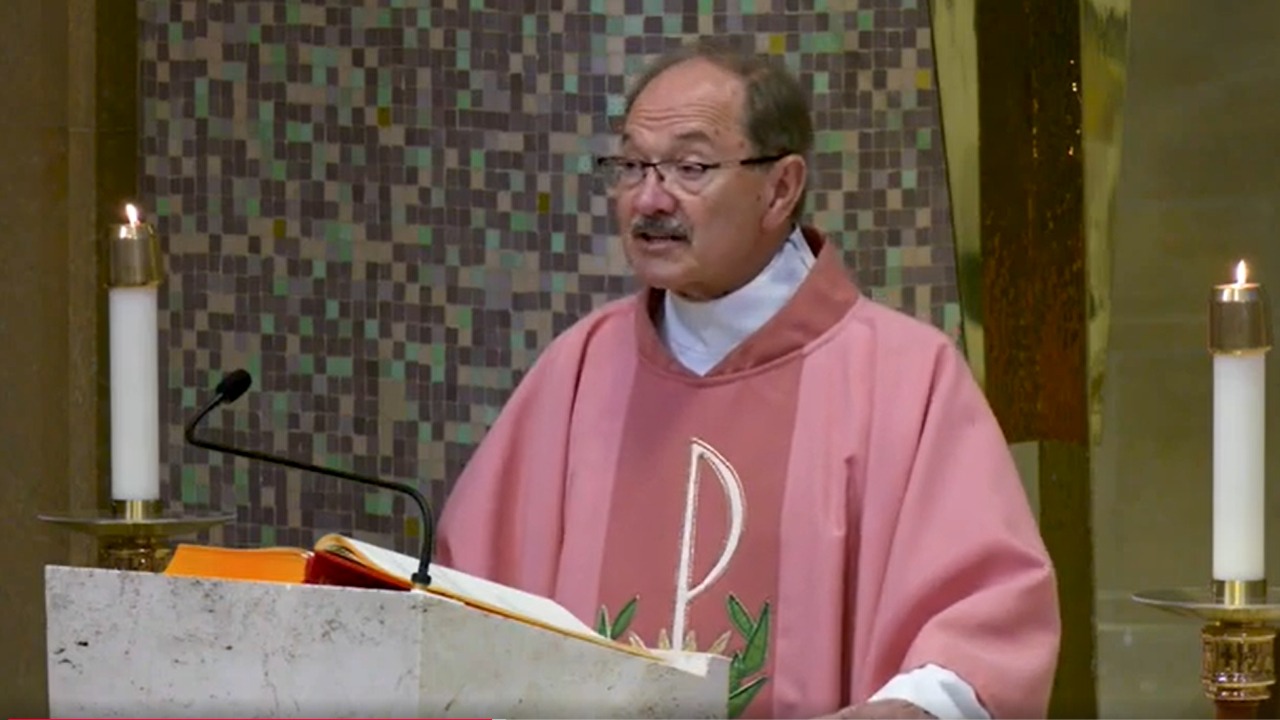Haga clic para la traducción al español.

VATICAN CITY (CNS) — The life of women in the Catholic Church “is full of scars” and alternating experiences of being encouraged or rejected, the president of Latin America’s religious superiors told members of the assembly of the Synod of Bishops.
But the most obvious and defining experience, “has been the love of God, a love that remains even beyond the efforts of some to make invisible the presence and contribution of women in the church,” said Sister Liliana Franco Echeverri, a member of the Company of Mary and president of the Confederation of Latin American and Caribbean Religious, or CLAR.
Sister Echeverri spoke to the synod assembly Oct. 13 as participants began work on the third section, or module, of the working document: “Co-responsibility in mission.”
The working document asked synod members to reflect on: ways to increase a sense of responsibility for mission among all Catholics; the relationship between liturgy and mission; the relationship between ordained ministry and the dignity of all the baptized; recognizing and promoting the dignity and gifts of women in the church; and involving them in leadership and decision-making, including investigating the possibility of women deacons.
Cardinal Jean-Claude Hollerich, relator general of the synod, introduced the work by emphasizing how the mission of the church to proclaim the Gospel is at the heart of the life of the church and, therefore, of the synod’s concern.
“All the baptized are called and have the right to participate in the mission of the church, all have an irreplaceable contribution to make,” he said.
In approaching the discussions, Cardinal Hollerich asked participants to recognize that “each of us is the bearer of a point of view that is essential, but to address the themes effectively, we are also called to realize our own partiality.”
For example, he said, “most of us are men. But men and women receive the same baptism and the same Spirit. The baptism of women is not inferior to the baptism of men. How can we ensure that women feel they are an integral part of this missionary church?”
Benedictine Mother Maria Ignazia Angelini, a theologian and spiritual assistant to the assembly participants, reflected on Jesus’ interaction with women, his inclusion of them among the disciples and his reliance on them to tell the apostles that he had risen from the dead.
“Jesus’ style seems to comprehend that women are dynamic elements of mission, like a presence that in critical, disruptive, unsettling passages senses the movement of life, weaves new, improbable relationships, patiently brings and dissolves conflicts,” she said. “It is not a question of rights but of gifts received.”
Sister Franco told the assembly that “when thinking about the mission of women in the church, it is important to look to Jesus, to learn from him. The Gospel gives an account of Jesus’ readiness to see and hear women, to raise them up, to dignify them, to send them out.”
For the synod and the church, she said, “true reform comes from an encounter with Jesus, in the echo of his Word, in learning of attitudes and criteria and in assimilating his style.”
In most parishes and dioceses around the world, Sister Franco said, “the church has a woman’s face,” at least when looking at those gathered for Mass, joining parish groups, teaching religion and helping the poor.”
“The church, which is mother and teacher, is also sister and disciple; it is feminine, but this does not exclude men,” she said, before listing the grammatically feminine qualities the church must have: “wisdom, kindness, tenderness, strength, creativity, boldness and the ability to give life and face situations courageously.”
“At the heart of the desire and the imperative for a greater presence and participation of women in the church,” Sister Franco said, “there is not an ambition for power or a feeling of inferiority nor egocentric quest for recognition.”
Instead, she said, “there is a clamor to live in fidelity to the plan of God, who desires that within the people with whom he has made a covenant, all would be recognized as brothers and sisters.”
Cardinal Joseph W. Tobin of Newark, New Jersey, told Catholic News Service after the session that the focus on mission and the previous days’ focus on communion are inextricably tied.
“I sense in the hall there is great hope, and I think it is because people recognize the abundance of gifts that are present, as well as the mutual respect and the freedom that is being afforded to every delegate to speak on the topics before us,” the cardinal said.
After days spent discussing what it means to be “a synodal church,” Cardinal Tobin said, participants moved on “to the experience and the reality of communion — communion with Christ, crucified and risen, but also communion with our brothers and sisters who share the great grace of baptism,” which gives “a fundamental dignity and a fundamental responsibility to everyone in the church.”
As the focus shifts to mission, he said, the church knows it can and must rely on “the gifts of everyone.”
When discussing communion, the cardinal said, members asked, “Who doesn’t experience communion, who doesn’t feel welcome?”
And as they move to looking at mission, he said, they need to ask, “Who doesn’t feel like the gifts they’ve been given can be laid at the feet of Christ in the church because they’re not wanted? Whose gifts have not yet been recognized?”
“We’re trying to look with humble and clear eyes at the gifts that have been given to the church, because the mission that we have to witness to Christ today is so important,” Cardinal Tobin said.
Copyright ©2023 Unless otherwise noted: © OSV News / Our Sunday Visitor, Inc. 2023; all content before December 31, 2022 © Catholic News Service / U.S Conference of Catholic Bishops. Send questions about this site to osvnews@osv.com.
El Sínodo examina la misión compartida de los católicos, pero también la exclusión de las mujeres
Por Cindy Wooden, Catholic News Service
CIUDAD DEL VATICANO (CNS) — La vida de las mujeres en la Iglesia Católica “está llena de cicatrices” y de experiencias alternas de ser alentadas o rechazadas, dijo el presidente de los superiores religiosos de América Latina a los miembros de la asamblea del Sínodo de los Obispos.
Pero la experiencia más evidente y definitoria, “ha sido el amor de Dios, un amor que permanece más allá del empeño de algunos por invisibilizar la presencia y el aporte de las mujeres en la construcción de la Iglesia”, dijo la hermana Liliana Franco Echeverri, miembro de la Compañía de María y presidenta de la Confederación Latinoamericana y Caribeña de Religiosos y Religiosas, o CLAR.
La hermana Echeverri se dirigió a la asamblea sinodal el 13 de octubre, cuando los participantes comenzaron a trabajar en la tercera sección, o módulo, del documento de trabajo: “Corresponsables en la misión”.
El documento de trabajo pedía a los miembros del sínodo que reflexionaran sobre: las formas de aumentar el sentido de responsabilidad por la misión entre todos los católicos; la relación entre liturgia y misión; la relación entre el ministerio ordenado y la dignidad de todos los bautizados; el reconocimiento y la promoción de la dignidad y los dones de las mujeres en la Iglesia; y su participación en el liderazgo y la toma de decisiones, incluida la investigación de la posibilidad de del acceso de las mujeres al diaconado.
El cardenal Jean-Claude Hollerich, relator general del sínodo, introdujo el trabajo subrayando cómo la misión de la Iglesia de proclamar el Evangelio está en el corazón de la vida de la Iglesia y, por tanto, de la preocupación del sínodo.
“Todos los bautizados están llamados y tienen derecho a participar en la misión de la Iglesia, todos tienen una contribución insustituible que hacer”, dijo.
Al abordar las discusiones, el cardenal Hollerich pidió a los participantes que reconocieran que “cada uno de nosotros es portador de un punto de vista que es esencial, pero para abordar los temas con eficacia, también estamos llamados a darnos cuenta de nuestra propia parcialidad”.
Por ejemplo, dijo, “la mayoría de nosotros somos hombres. Pero hombres y mujeres reciben el mismo bautismo y Espíritu. El bautismo de las mujeres no es inferior al de los hombres. ¿Cómo conseguir que las mujeres se sientan parte integrante de esta Iglesia misionera?”.
La madre benedictina Maria Ignazia Angelini, teóloga y asistente espiritual de los participantes en la asamblea, reflexionó sobre la interacción de Jesús con las mujeres, su inclusión entre los discípulos y su confianza en ellas para comunicar a los apóstoles que había resucitado de entre los muertos.
“El estilo de Jesús parece comprender que las mujeres son elementos dinámicos de la misión, como una presencia que, en pasajes críticos, perturbadores, inquietantes, siente el movimiento de la vida, teje relaciones nuevas e improbables, trae y disuelve conflictos con paciencia”, dijo. “No es una cuestión de derechos, sino de dones recibidos”.
La hermana Franco dijo a la asamblea que “al pensar en la misión de la mujer en la Iglesia, es importante mirar a Jesús, aprender de él. El Evangelio da cuenta de la disposición de Jesús a ver y escuchar a las mujeres, a levantarlas, a dignificarlas, a enviarlas”.
Para el Sínodo y la Iglesia, dijo, “la verdadera reforma viene del encuentro con Jesús, el eco de su palabra, el aprendizaje de sus actitudes y criterios, en la asimilación de su estilo”.
En la mayoría de las parroquias y diócesis del mundo, dijo la hermana Franco, “la Iglesia tiene rostro de mujer”, al menos cuando se mira a los que se reúnen para la Misa, se unen a los grupos parroquiales, enseñan religión y ayudan a los pobres.
“La Iglesia, que es madre y maestra, es también hermana y discípula; es femenina, pero esto no excluye a los hombres”, dijo la religiosa colombiana, antes de enumerar las cualidades gramaticalmente femeninas que debe tener la Iglesia: “la sabiduría, la bondad, la ternura, la fortaleza, la creatividad, la parresia y la capacidad de dar la vida y enfrentar las situaciones con osadía”.
“En el deseo e imperativo de una mayor presencia y participación de las mujeres en la Iglesia”, dijo la hermana Franco, “no hay ambición de poder ni sentimiento de inferioridad ni búsqueda egoísta de reconocimiento”.
Por el contrario, dijo, “hay un clamor por vivir en fidelidad al plan de Dios, que desea que dentro del pueblo con el que ha hecho alianza, todos sean reconocidos como hermanos y hermanas”.
El cardenal Joseph W. Tobin, de Newark, Nueva Jersey, dijo al Catholic News Service tras la sesión que el tema de la misión y el de la comunión de los días anteriores están inextricablemente unidos.
“Percibo en la sala una gran esperanza, y creo que es porque la gente reconoce la abundancia de dones que están presentes, así como el respeto mutuo y la libertad que se concede a cada delegado para hablar sobre los temas que tenemos ante nosotros”, dijo el cardenal.
Tras unos días de debate sobre lo que significa ser “una Iglesia sinodal”, dijo el cardenal Tobin, los participantes pasaron “a la experiencia y la realidad de la comunión: comunión con Cristo, crucificado y resucitado, pero también comunión con nuestros hermanos y hermanas que comparten la gran gracia del bautismo”, que otorga “una dignidad y una responsabilidad fundamentales a todos en la Iglesia”.
Al centrarse en la misión, dijo, la Iglesia sabe que puede y debe contar con “los dones de todos”.
Al hablar de la comunión, dijo el cardenal, los miembros preguntaron: “¿Quién no experimenta la comunión? ¿quién no se siente bienvenido?”.
Y al pasar a considerar la misión, dijo, tienen que preguntarse: “¿Quién no siente que los dones que se le han dado pueden ponerse a los pies de Cristo en la iglesia porque no se le quiere? ¿A quién no se le han reconocido todavía sus dones?”.
“Estamos intentando mirar con ojos humildes y con claridad los dones que se han dado a la Iglesia, porque la misión que tenemos de dar testimonio de Cristo hoy es muy importante”, dijo el cardenal Tobin.









